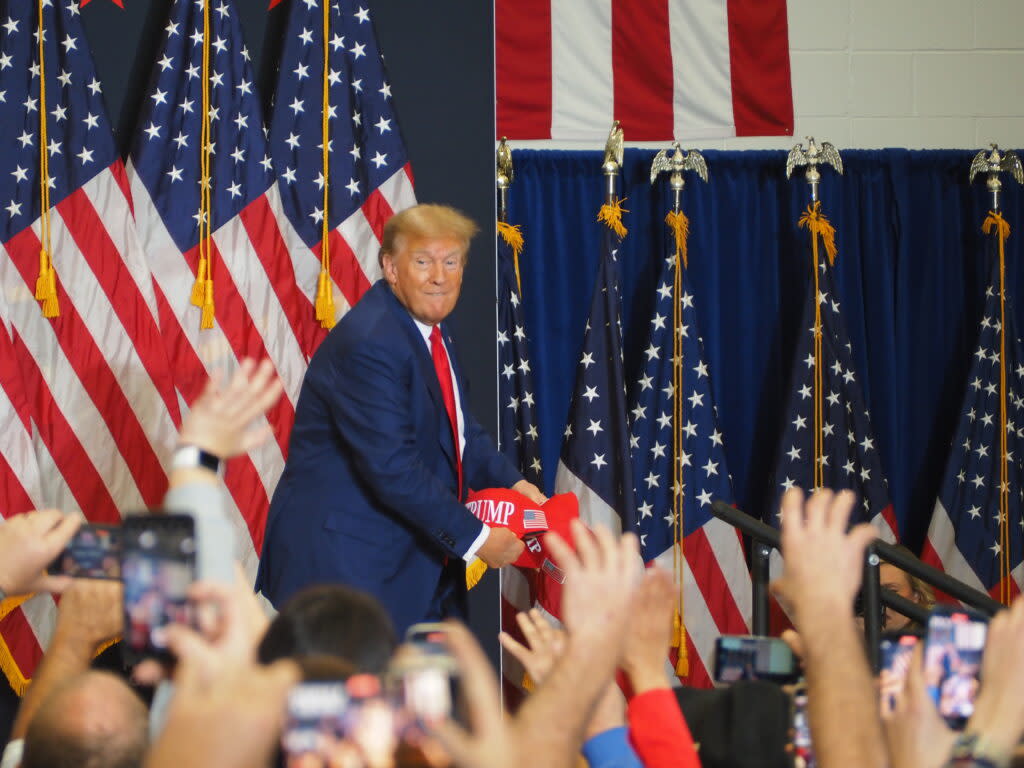Trump signals he’s open to state limits on contraceptive access, then insists he’s not

- Oops!Something went wrong.Please try again later.
Former President Donald Trump on Tuesday was asked if he supports “any restrictions on a person’s right to contraception.” (Photo of a package of birth control pills by Getty Images)
WASHINGTON — Donald Trump, the Republican Party’s presumptive nominee for president, suggested during a taped interview with a Pittsburgh TV news station Tuesday that he might be open to states restricting access to contraceptives, though he later appeared to backtrack.
“We’re looking at that and I’m going to have a policy on that very shortly and I think it’s something that you’ll find interesting,” Trump said on KDKA. “It’s another issue that’s very interesting. But you will find it very smart. I think it’s a smart decision, but we’ll be releasing it very soon.”
Trump had been asked if he supports “any restrictions on a person’s right to contraception.”
Trump later added that “things really do have a lot to do with the states. And some states are going to have different policies than others.” That comment came just after being asked if he “may want to support some restrictions, like the morning-after pill or something?”
The former president, who is currently on trial for allegedly facilitating hush money payments to an adult film actress during his 2016 campaign to cover up a prior affair, later posted on his social media platform that he wasn’t advocating for birth control restrictions.
“I HAVE NEVER, AND WILL NEVER ADVOCATE IMPOSING RESTRICTIONS ON BIRTH CONTROL, or other contraceptives,” Trump wrote. “This is a Democrat fabricated lie MISINFORMATION/DISINFORMATION, because they have nothing else to run on except FAILURE, POVERTY, AND DEATH. I DO NOT SUPPORT A BAN ON BIRTH CONTROL, AND NEITHER WILL THE REPUBLICAN PARTY!”
Supreme Court rulings
The U.S. Supreme Court has twice ruled in favor of privacy rights for decisions about contraceptives, meaning that any state looking to restrict or ban access to birth control would quickly see that law challenged in federal court.
In the1965 Griswold v. Connecticut case, the justices struck down a Connecticut law that prevented married couples from using birth control, writing that the “right to privacy can be inferred from several amendments in the Bill of Rights, and this right prevents states from making the use of contraception by married couples illegal.”
The Supreme Court later ruled in the 1972 Eisenstadt v. Baird case that the same privacy rights that protected married couples’ decision-making about contraceptives also protected unmarried people.
In that case, the justices held that “unmarried couples have the right to use contraception, based on the Equal Protection Clause of the Fourteenth Amendment and the more nebulous constitutional right to privacy.”
Biden-Harris spokesperson Sarafina Chitika released a written statement Tuesday that Trump’s comments show he “wants to rip away our freedom to access birth control.”
“Women across the country are already suffering from Donald Trump’s post-Roe nightmare, and if he wins a second term, it’s clear he wants to go even further by restricting access to birth control and emergency contraceptives,” Chitika wrote. “It’s not enough for Trump that women’s lives are being put at risk, doctors are being threatened with jail time, and extreme bans are being enacted with no exceptions for rape or incest.”
KDKA-TV Money & Politics Editor Jon Delano posted on social media that viewers interested in the Trump interview could tune in at “4, 5, and 6 to hear comments on the trial, abortion, contraceptives, the economy, energy, trade, and the fairness of PA’s election.”
The Biden campaign posted clips of the interview on their social media account, but it didn’t appear available anywhere else prior to KDKA’s airing.
Other policy hints from Trump
Trump has teased out providing clear policy plans before, telling Time magazine in an April interview that his campaign would put out details in the weeks ahead about his “strong views” on access to mifepristone. The campaign had not done so as of Tuesday afternoon.
The pharmaceutical is one of two drugs used in medication abortions and is currently in front of the U.S. Supreme Court.
The justices heard oral arguments in the case in March and are expected to decide this summer whether to leave the U.S. Food and Drug Administration’s prescribing guidelines in place or revert to what was used before changes began taking effect in 2016.
Trump said during the Time magazine interview that he wasn’t going to explain his beliefs about access to mifepristone just then.
“Well, I have an opinion on that, but I’m not going to explain,” Trump said, according to the transcript of the interview. “I’m not gonna say it yet. But I have pretty strong views on that. And I’ll be releasing it probably over the next week.”
The post Trump signals he’s open to state limits on contraceptive access, then insists he’s not appeared first on Michigan Advance.

